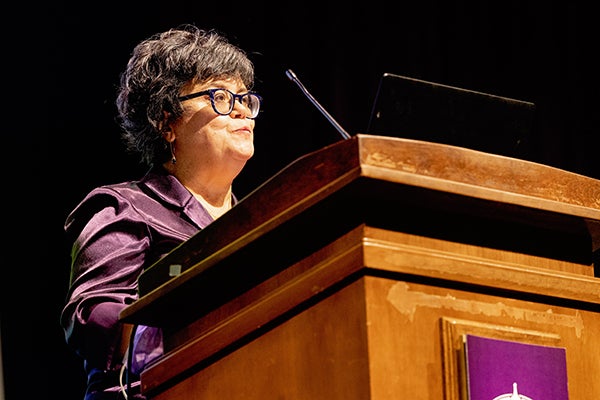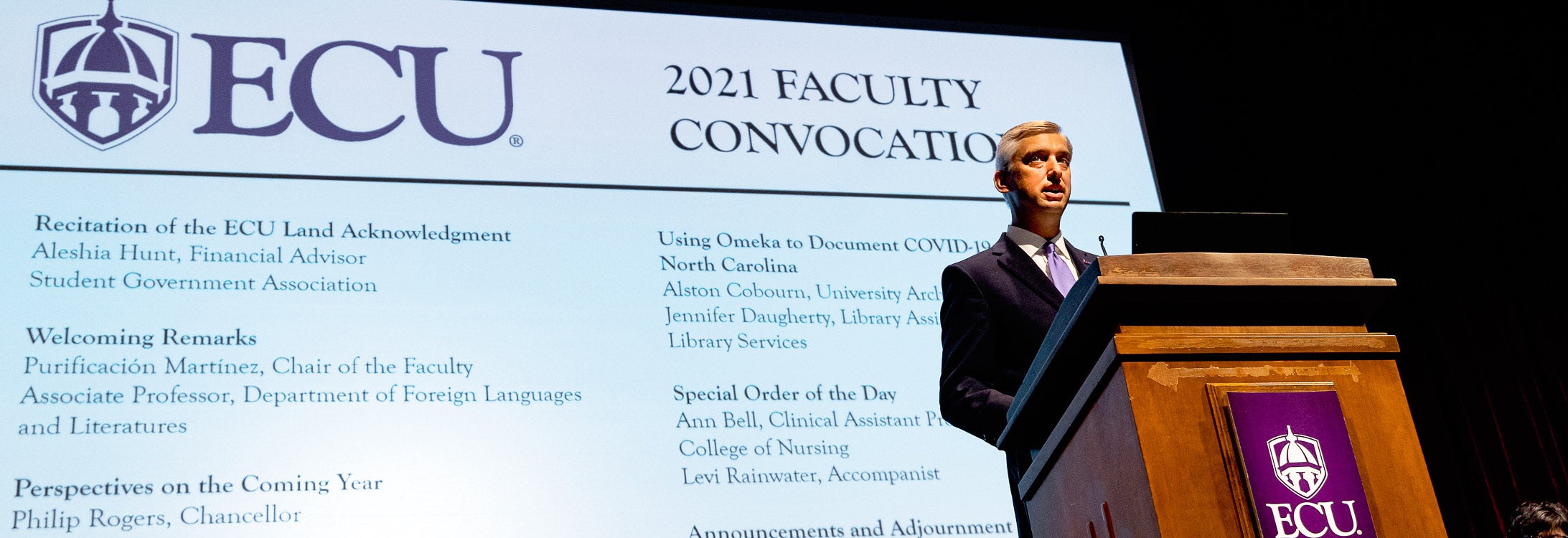PIRATE CONCLAVE
Chancellor, faculty chair share perspectives on coming year
An air of excitement and hopefulness filled East Carolina University’s Wright Auditorium Friday morning as the institution’s educators gathered to officially launch the new academic year with faculty convocation.
After a recitiation of ECU’s land acknowledgement by Student Government Financial Advisor Aleshia Hunt, Faculty Chair Purificación Martínez welcomed the faculty members and, in his first convocation as chancellor, Dr. Philip Rogers presented his perspectives on the coming year.
“Faculty convocation is an important tradition as we begin a new academic year together, a time when we can recommit ourselves to our mission and to our shared values as a university, and this fall, perhaps more than any other, we have an opportunity to celebrate what’s possible in the year ahead through the reawakening of our campus after a season of physical separation,” Rogers said.
Rogers acknowledged the challenges ECU faces as it looks to the future, including serving learners in a pandemic and post-pandemic environment, economic pressures, mental health and well-being, and social justice.

Chair Purificación Martínez encouraged her colleagues to make a difference starting at the local level.
“It’s going to take a collective effort to thrive in this complex landscape of American higher education,” he said. “And here at ECU and in North Carolina, our students and our region are counting on us now perhaps more than ever.”
As he listed a selection of faculty accomplishments, Rogers said it was hard to choose from a much larger list. He noted ECU’s ranking in the top 16% of schools in the social mobility category of U.S. News’ Best Colleges rankings, faculty generation of funded projects and published works, and recognition for first-generation student success at ECU.
Rogers thanked the Return of Pirate Nation Planning Team and its subgroups for their work in preparing for the fall semester and outlined the major steps ECU has taken to mitigate the impact of COVID-19.
He also noted the challenge of maintaining enrollment as the nation faces an expected reduction in the number of students entering college in the coming years, emphasizing the importance of recruitment and retention, attracting and serving adult learners, and leveraging new digital technologies.
This year’s rising sophomores, he said, did not enjoy the same experiences most college graduates remember as freshmen, which help anchor them to campus. “All of us need to be intentional about delivering on that meaningful student experience,” he said.
Rogers also outlined the status and importance of clinical integration with Vidant Health, fiscal sustainability and equity, inclusion and social justice.
“I’m here for you. I’m grateful for you. Go Pirates and have a great fall semester,” he told the faculty in closing.
Martínez based her remarks on a visit to Getaria, a coastal town in the Basque Country of Spain, and to the Museum at the Memorial Centre for the Victims of Terrorism.
“Until we reckon with, acknowledge and take measures to remedy these pasts, these global pasts, we can start thousands of meetings at ECU and elsewhere with as many land acknowledgments as we want, or write hundreds of manifestos with inspiring words, reminiscent of Martin Luther King’s ‘I Have a Dream’ speech. They will be beautiful, and they will suit our souls, but they will not produce the necessary change,” she said.
She encouraged the faculty to consider their global responsibility and to take steps to foster change.
“We as individuals might not be able to change international policy, or for that matter, national, state or UNC System policy, but this year we, the faculty at ECU, can make a difference because we understand that local actions bring global change,” she said.
Following the faculty chair’s remarks, university archivist Alston Cobourn and library assistant professor Jennifer Daugherty outlined a project to document the pandemic by offering members of the community a platform to share submissions documenting their experiences. The collection has received more than 250 submissions so far, including personal reflections, photographs, videos and original artwork.
“Because of these submissions, researchers will have a better understanding of how the pandemic affected East Carolina University and the eastern North Carolina region at large,” Cobourn said. “We also saw this collecting project as an opportunity to give people in our community a voice and an outlet for sharing their stories. At a time when many felt and still feel powerless and lonely, we felt that the opportunity to write down their experiences for posterity could give them agency.”
For more information visit collections.ecu.edu.
The performance for this year’s faculty convocation featured Ann Bell, clinical assistant professor in the College of Nursing, reciting Joy Harjo’s poem “Bless This Land” with a recorded flute accompaniment by Levi Rainwater.
